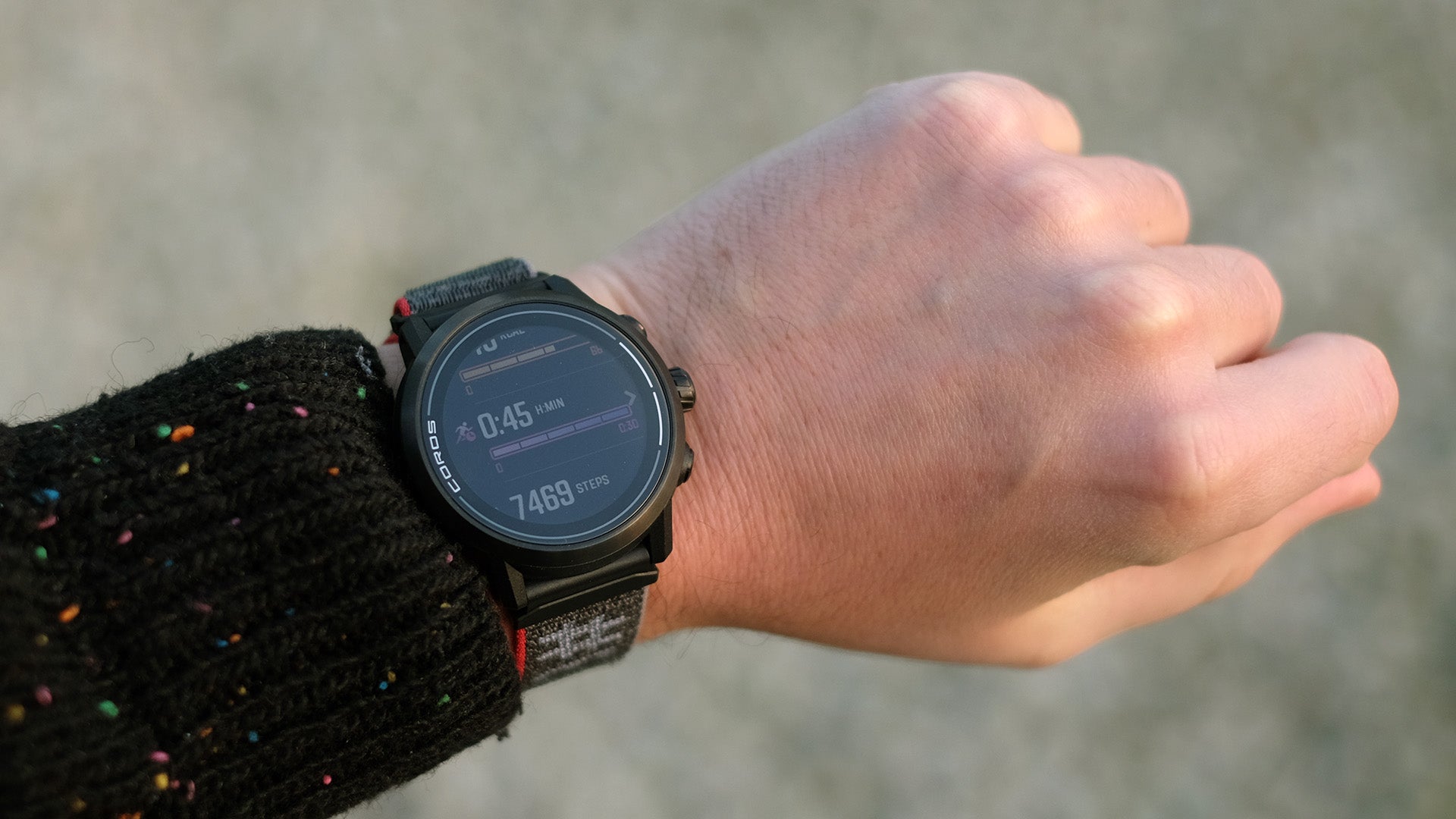Verdict
The Coros Apex 2 has everything you need in a high-end fitness watch – and some extra bits you arguably don’t – cased in a tough top-quality shell. Some of its more advanced features could do with further development, though.
Pros
- Top-tier titanium and Sapphire build
- Small face but great screen clarity
- Good battery life
- Sufficient number of advanced fitness features
Cons
- On-watch maps are of limited use
- Crown-led navigation can feel clunky
- Some issues with early workout HR reliability
-
ECGThis is one of the few pure fitness watches with an ECG sensor, used to measure heart rate variability. -
Seventeen-day battery lifeWhile this watch has only half the battery life of the Apex 2 Pro version, a stamina of up to three weeks is still fantastic. -
Sapphire screenUnlike most rivals at this price, the Apex 2 has an ultra-hard Sapphire screen for superior scratch protection.
Introduction
The Coros Apex 2 is a high-end dedicated exercise watch and one of the key rivals to a Garmin from the Forerunner or Fenix series.
So, should you buy the Apex 2 instead of a Garmin? There’s a compelling list of reasons to do just that. The Apex 2 is priced similarly to the Forerunner 255, but it has a higher-end build, mapping features completely absent from more affordable Garmins and more refined haptics than on any Garmin watch out there.
However, the Apex 2’s interface isn’t quite as rich or intuitive, and its tracking accuracy is a little worse. And while it has onboard maps, the feature is not even close to the mapping support available on pricier watches, like the Garmin Forerunner 955 and Fenix 7.
I do significantly prefer living with the Apex 2 to the Suunto watches I’ve tried, though.
Design
- 5ATM water resistance
- Part-titanium build and Sapphire screen
- 42mm-ish watch face
The Coros Apex 2 is a small-faced watch, but it’s thicker than you might think. Its build is also significantly more upscale than its closest Garmin rival in terms of cost, the Forerunner 255.
The Apex 2 has a titanium back and bezel, whereas the Forerunner 255 has a basic plastic polymer case. Add the Sapphire screen protection, and the Apex 2 starts to look more like Garmin’s top-end watches than anything you can get for remotely near its price.
Even the Fenix 7 uses Gorilla Glass and stainless steel unless you upgrade to the Sapphire Solar model. Coros is earning major points here.
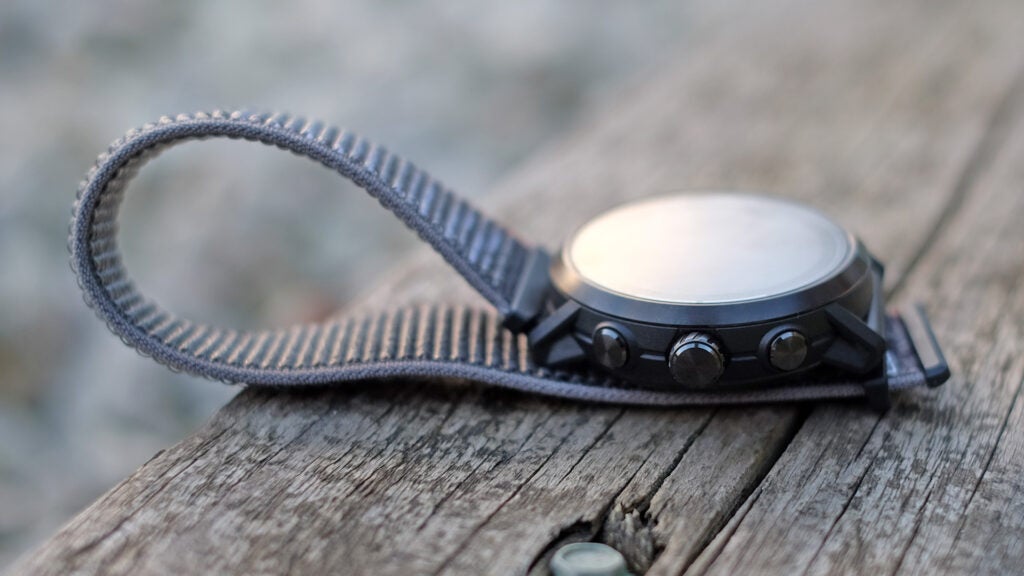
The Coros Apex 2 also has a rather neat strap that comes across more like an aftermarket accessory than the basic strap included with the average wearable. It’s a nylon weave with “explore perfection” written across its length. I could do without the motivational taglines, but this thing is very comfortable. With a Coros Apex 2, 24/7 wear is no trial.
Its screen is great too. This is a transflective LCD, similar to the style Garmin uses. The screen’s visibility here is much better than that of rival Suunto watches, and the front light is bright and consistent across the face.
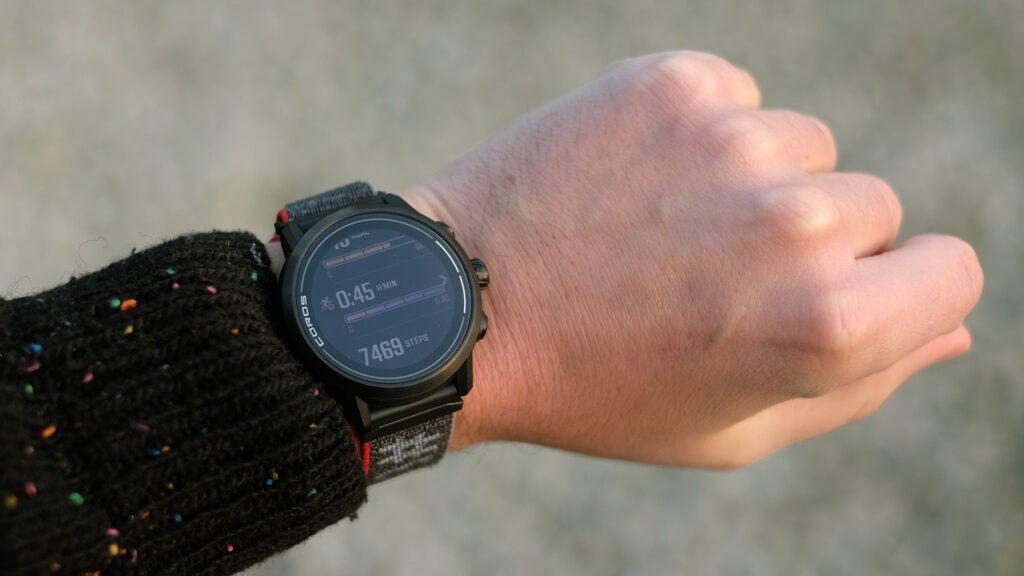
Interface
- Rotary crown-led navigation
- Control can feel slow
- Has a scroll of core daily stats
The Coros Apex 2’s interface takes cues from Apple and Gamin, but unfortunately, it does not come off that well in either comparison.
The Apple Watch influence is seen in the rotating crown, which is the main control interface. While the watch has a touchscreen, it’s not used in the main interface as standard. The crown is a continuous (smooth) control, whereas the interface movement is stepped and discrete.
Ideally, you want the style of control motions and the character of movement in your interface to match, but there’s no match here. It made me realise that I preferred the button approach of the Forerunner 255, even if it seemed more basic from afar.
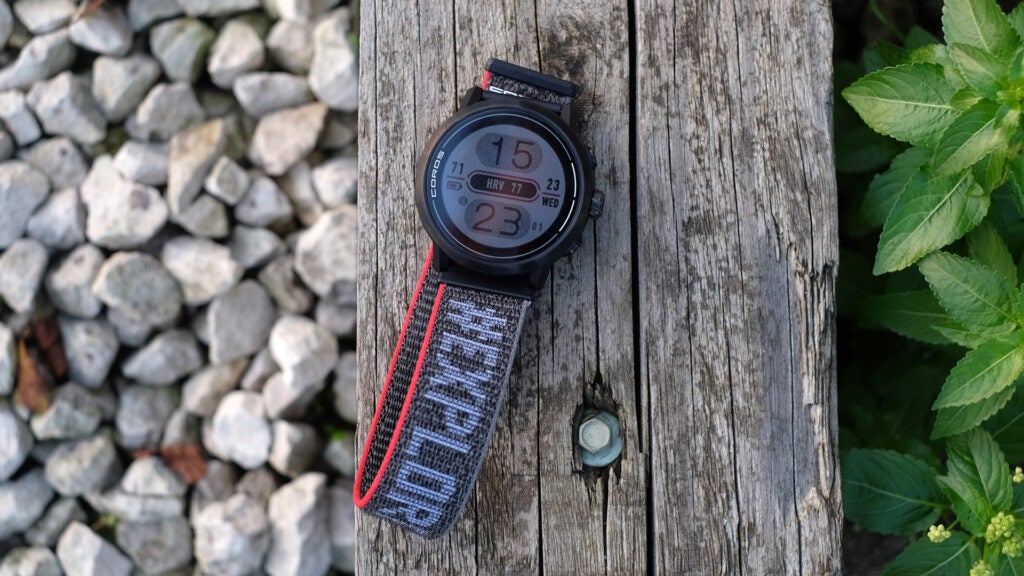
This comparison is apt because the Apex 2’s interface is very similar to Garmin’s. A list of entries for important daily stats, including calories, steps, floors climbed, recovery state and heart rate, sits below the watch face.
From the watch face, you press down on the crown to get to the workout mode menu. Coros doesn’t really mess up any of this stuff, but Garmin does it better with a better control interface, plainer fonts and a slightly more successful all-round user experience.
Features and Fitness
- Programmable workouts
- Good exercise mode depth and specialisation
- Downloadable maps, but integration is limited
One of the parts that drew me to the Coros Apex 2 was its mapping support. This watch has 8GB storage, and you can use that to transfer an entire continent’s worth of maps.
This is normally one of the key draws of a high-end Garmin – even if I barely use it myself. Here, Coros offers free downloadable maps at a couple of hundred pounds less than Garmin.
But don’t be fooled by this: the Apex 2’s use of maps is not great. No maps are preinstalled, and getting them on the watch is an extremely slow drag-and-drop process that can take hours due to the slow file transfer speeds.
If you don’t add GPX route files to the watch, all you can do is scroll and zoom around the map image. You can’t create routes on the watch, or even in the Coros phone app. And there’s no map screen added to, for example, the Run activity mode.
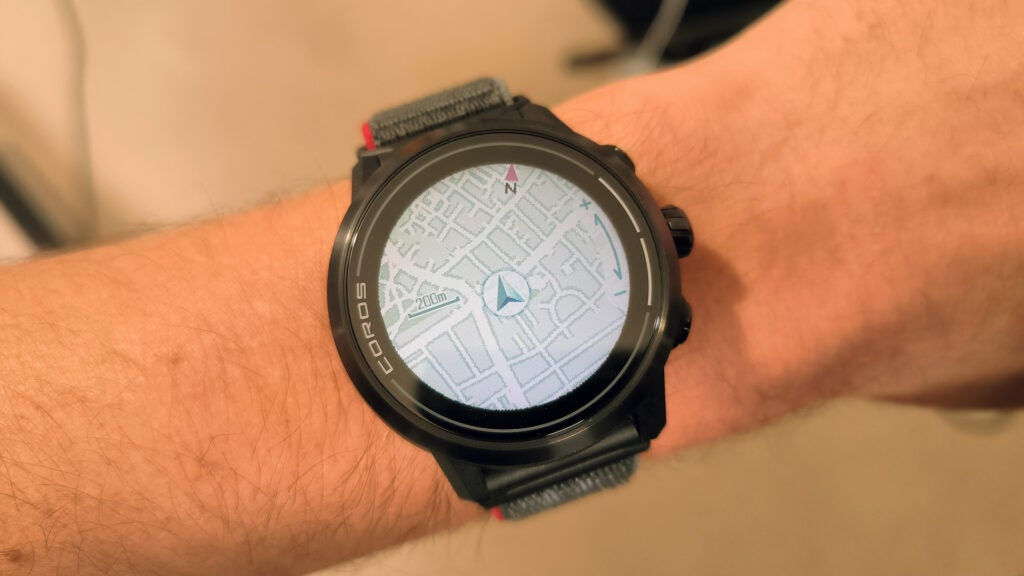
To use maps to follow a route, you have to use the Navigation mode. Still, at least the maps are free to download, and the Coros website lets you select the area you need, to avoid the 2hr wait when jamming in the entire European continent. Topographic and landscape maps are available, but they don’t feature information like road names, so they are generally better for non-urban use.
You have about 6.3GB of space on the Apex 2 – not quite enough to fit the whole of North America on it, but Coros splits up the giant continents to make that a non-issue.
You may want to save some space for music anyway. The Apex 2 can connect to wireless headphones to play tracks, but these need to be your own digital files, as there’s no support for streaming services like Spotify, and you can’t control music played on your phone either.

Some of the Apex 2’s features are underdeveloped, but their breadth is impressive. It has an ECG reader, for example. This monitors your heart rate and rhythm using a weak electric signal – rather than a light sensor of the standard wearable HR reader.
Other watches, such as the Apple Watch Series 8, make use of this tech to check for potential heart abnormalities, but the Apex 2 uses it for manual HRV readings. HRV is heart rate variability, which other big brands measure overnight via the optical reader.
While I’m no expert, a quick 30 second stint does not seem the best time to take an HRV reading. It means there’s very little consistency between the readings, and the measurement window is too small. A higher HRV is generally positive, but it’s difficult for the average person to decipher, even when displayed as a single daily score.
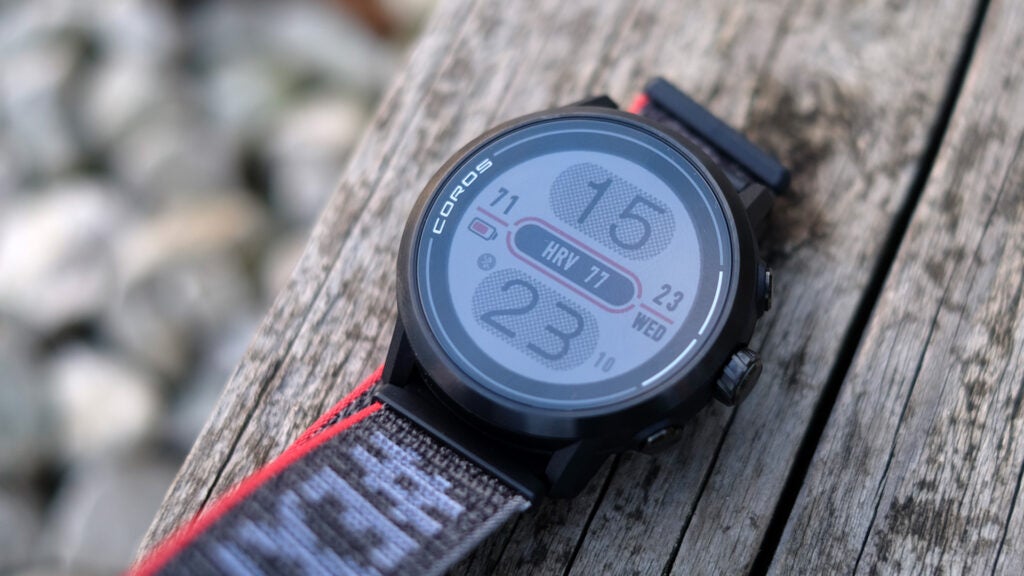
Let’s get to the proper stuff. The Apex 2 has 27 exercise tracking modes with generally greater depth than those of an average fitness tracker. Its cross-country skiing mode, for example, has stats like grade, elevation, elevation gain and loss – and 3D distance, accounting for terrain in the core distance stat.
Coros also beat Garmin and Apple to offering accessory-free running power statistics. This is where your running efforts are measured in watts, to take changing terrain into account in a manner that raw pace does not. It’s yet another thing you can base your workouts on, alongside time, heart rate, distance and pace.
The Apex 2 also offers helpful stats when you’re not mid-workout. There’s your recovery state, your current running performance and VO2 Max. You can also create custom workouts and transfer these to the watch, so it can guide you through them in real time.
The workouts are not as diverse as what Garmin offers. There’s no yoga, for example, but in the Strength section, there’s a large library for selecting specific exercises.
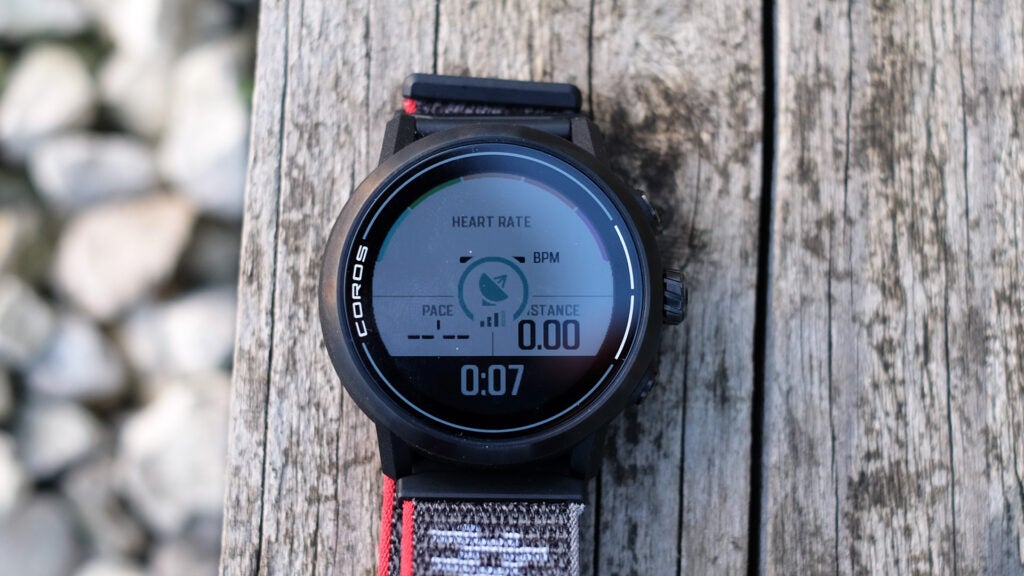
Performance
- Initial triangulation is slow, but GPS performance is OK
- Heart rate performance can be faulty in the first few mins but is otherwise solid
- Very good battery life
The Coros Apex 2 lacks the multi-band GPS of the Apex 2 Pro, but you may not need this unless you plan on running among skyscrapers or in valleys, where the extra transmission band comes to the fore. Running in parks and along residential streets, I had no issues with the GPS signal strength.
However, the Apex 2’s triangulation time can be maddeningly slow when the watch’s onboard information expires – it can take up to 5mins – and it doesn’t seem to update automatically while connected to a phone. This is something you’re only likely to see regularly if you take longer breaks between exercise sessions, but it’s still frustrating.
Location readings when locked on were consistent. When worn with a Garmin Enduro 2 – one watch per arm – the Apex 2 recorded slightly shorter distances at each kilometre, mounting up to a consistent 1-2% difference. Looking at the recorded routes, the Apex did have me running through the odd row of houses or a lake, usually in the first third of a workout.
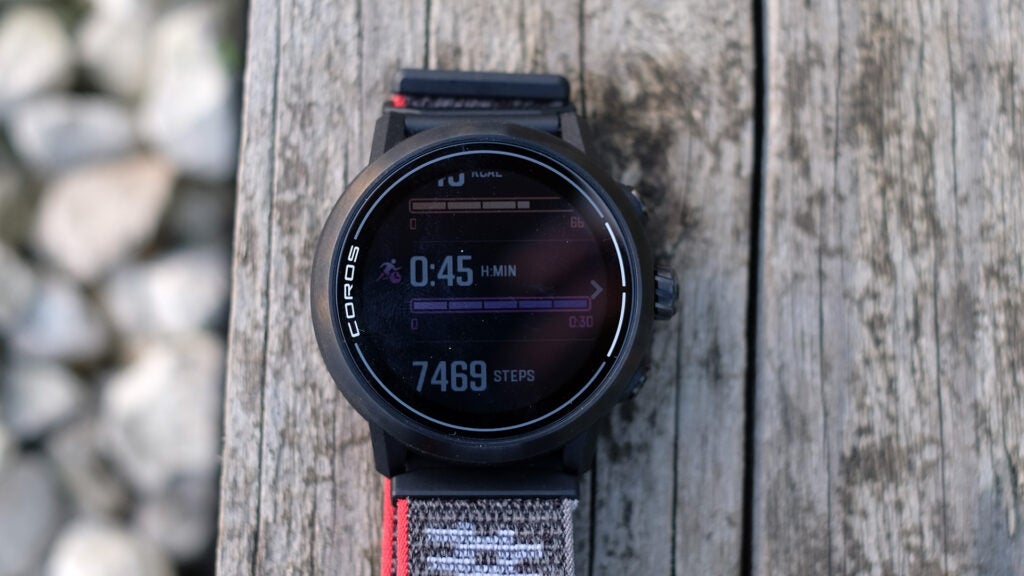
The heart rate reader seems to have more substantial issues with the early parts of workouts. In about half of the sessions, there were unexpected dips in readings within the first 5mins. This used to be the norm for just about all wearable heart rate readers. You had to expect the occasional bit of junk at first. However, I find that the latest Garmins and the Apple Watch Series 8 manage to avoid this.
While it’s a step below the best, I do think that the Apex 2’s heart rate reader is decent.
Battery life is very good too. Coros says a charge will last up to 17 days, or 45hrs in standard GPS mode and 30hrs in its All Systems GPS mode. It seems the only thing that can really kill the battery is music playback, which brings it down to as little as 7hrs.
After workouts, 2% is the typical battery loss. The Apex 2 is the kind of watch that lasts so long you can completely forget about its charge levels and feel confident going out for a run even with only 10% battery left, which would not cut it with a “smarter” watch.
Latest Deals
Should you buy it?
A lot here for the money: The Coros Apex 2 offers a wide array of features for the money, including downloadable maps and a higher-grade build than rival Garmins thanks to the Sapphire display and part-titanium casing.
Poor navigation: This watch’s maps and music integration are basic, and the crown-led navigation can feel awkward. The heart rate sensor also has regular minor stumbles in the early parts of workouts, which some other companies have managed to largely iron out.
Final Thoughts
The Coros Apex 2 is a strong running watch with a broad range of features, including ECG – one not often found on purely fitness-driven wearables. Several aspects of its design also beat the Garmin Forerunner 255 Music, one of its key rivals.
The Apex 2 has Sapphire screen protection and part-titanium casing – some of the best materials you could ask for. However, I still think the Pace 2 is the hardest hitter in the Coros range. While the latter lacks maps and music, I don’t think Coros pulls off these features anywhere near as well as Garmin. And Coros’s implementation of ECG isn’t all that useful at the moment.
How we test
We thoroughly test every fitness tracker we review. We use industry standard testing to compare features properly and we use the watch as our main device over the review period. We’ll always tell you what we find and we never, ever, accept money to review a product.
Compared against rival devices
Heart rate data compared against dedicated heart rate devices
Worn as our main tracker during the testing period
FAQs
This watch is water-resistant to 5ATM, making it fine for surface-level pool swimming.
The Apex 2 is the step-up model, with a higher-end build and support for lots of extra features, including maps, music, ECG and blood oxygenation readings.
Maps can be downloaded from the Coros website and routes added to the watch via the Coros app.
Verdict
The Coros Apex 2 has everything you need in a high-end fitness watch – and some extra bits you arguably don’t – cased in a tough top-quality shell. Some of its more advanced features could do with further development, though.
Pros
- Top-tier titanium and Sapphire build
- Small face but great screen clarity
- Good battery life
- Sufficient number of advanced fitness features
Cons
- On-watch maps are of limited use
- Crown-led navigation can feel clunky
- Some issues with early workout HR reliability
-
ECGThis is one of the few pure fitness watches with an ECG sensor, used to measure heart rate variability. -
Seventeen-day battery lifeWhile this watch has only half the battery life of the Apex 2 Pro version, a stamina of up to three weeks is still fantastic. -
Sapphire screenUnlike most rivals at this price, the Apex 2 has an ultra-hard Sapphire screen for superior scratch protection.
Introduction
The Coros Apex 2 is a high-end dedicated exercise watch and one of the key rivals to a Garmin from the Forerunner or Fenix series.
So, should you buy the Apex 2 instead of a Garmin? There’s a compelling list of reasons to do just that. The Apex 2 is priced similarly to the Forerunner 255, but it has a higher-end build, mapping features completely absent from more affordable Garmins and more refined haptics than on any Garmin watch out there.
However, the Apex 2’s interface isn’t quite as rich or intuitive, and its tracking accuracy is a little worse. And while it has onboard maps, the feature is not even close to the mapping support available on pricier watches, like the Garmin Forerunner 955 and Fenix 7.
I do significantly prefer living with the Apex 2 to the Suunto watches I’ve tried, though.
Design
- 5ATM water resistance
- Part-titanium build and Sapphire screen
- 42mm-ish watch face
The Coros Apex 2 is a small-faced watch, but it’s thicker than you might think. Its build is also significantly more upscale than its closest Garmin rival in terms of cost, the Forerunner 255.
The Apex 2 has a titanium back and bezel, whereas the Forerunner 255 has a basic plastic polymer case. Add the Sapphire screen protection, and the Apex 2 starts to look more like Garmin’s top-end watches than anything you can get for remotely near its price.
Even the Fenix 7 uses Gorilla Glass and stainless steel unless you upgrade to the Sapphire Solar model. Coros is earning major points here.

The Coros Apex 2 also has a rather neat strap that comes across more like an aftermarket accessory than the basic strap included with the average wearable. It’s a nylon weave with “explore perfection” written across its length. I could do without the motivational taglines, but this thing is very comfortable. With a Coros Apex 2, 24/7 wear is no trial.
Its screen is great too. This is a transflective LCD, similar to the style Garmin uses. The screen’s visibility here is much better than that of rival Suunto watches, and the front light is bright and consistent across the face.

Interface
- Rotary crown-led navigation
- Control can feel slow
- Has a scroll of core daily stats
The Coros Apex 2’s interface takes cues from Apple and Gamin, but unfortunately, it does not come off that well in either comparison.
The Apple Watch influence is seen in the rotating crown, which is the main control interface. While the watch has a touchscreen, it’s not used in the main interface as standard. The crown is a continuous (smooth) control, whereas the interface movement is stepped and discrete.
Ideally, you want the style of control motions and the character of movement in your interface to match, but there’s no match here. It made me realise that I preferred the button approach of the Forerunner 255, even if it seemed more basic from afar.

This comparison is apt because the Apex 2’s interface is very similar to Garmin’s. A list of entries for important daily stats, including calories, steps, floors climbed, recovery state and heart rate, sits below the watch face.
From the watch face, you press down on the crown to get to the workout mode menu. Coros doesn’t really mess up any of this stuff, but Garmin does it better with a better control interface, plainer fonts and a slightly more successful all-round user experience.
Features and Fitness
- Programmable workouts
- Good exercise mode depth and specialisation
- Downloadable maps, but integration is limited
One of the parts that drew me to the Coros Apex 2 was its mapping support. This watch has 8GB storage, and you can use that to transfer an entire continent’s worth of maps.
This is normally one of the key draws of a high-end Garmin – even if I barely use it myself. Here, Coros offers free downloadable maps at a couple of hundred pounds less than Garmin.
But don’t be fooled by this: the Apex 2’s use of maps is not great. No maps are preinstalled, and getting them on the watch is an extremely slow drag-and-drop process that can take hours due to the slow file transfer speeds.
If you don’t add GPX route files to the watch, all you can do is scroll and zoom around the map image. You can’t create routes on the watch, or even in the Coros phone app. And there’s no map screen added to, for example, the Run activity mode.

To use maps to follow a route, you have to use the Navigation mode. Still, at least the maps are free to download, and the Coros website lets you select the area you need, to avoid the 2hr wait when jamming in the entire European continent. Topographic and landscape maps are available, but they don’t feature information like road names, so they are generally better for non-urban use.
You have about 6.3GB of space on the Apex 2 – not quite enough to fit the whole of North America on it, but Coros splits up the giant continents to make that a non-issue.
You may want to save some space for music anyway. The Apex 2 can connect to wireless headphones to play tracks, but these need to be your own digital files, as there’s no support for streaming services like Spotify, and you can’t control music played on your phone either.

Some of the Apex 2’s features are underdeveloped, but their breadth is impressive. It has an ECG reader, for example. This monitors your heart rate and rhythm using a weak electric signal – rather than a light sensor of the standard wearable HR reader.
Other watches, such as the Apple Watch Series 8, make use of this tech to check for potential heart abnormalities, but the Apex 2 uses it for manual HRV readings. HRV is heart rate variability, which other big brands measure overnight via the optical reader.
While I’m no expert, a quick 30 second stint does not seem the best time to take an HRV reading. It means there’s very little consistency between the readings, and the measurement window is too small. A higher HRV is generally positive, but it’s difficult for the average person to decipher, even when displayed as a single daily score.

Let’s get to the proper stuff. The Apex 2 has 27 exercise tracking modes with generally greater depth than those of an average fitness tracker. Its cross-country skiing mode, for example, has stats like grade, elevation, elevation gain and loss – and 3D distance, accounting for terrain in the core distance stat.
Coros also beat Garmin and Apple to offering accessory-free running power statistics. This is where your running efforts are measured in watts, to take changing terrain into account in a manner that raw pace does not. It’s yet another thing you can base your workouts on, alongside time, heart rate, distance and pace.
The Apex 2 also offers helpful stats when you’re not mid-workout. There’s your recovery state, your current running performance and VO2 Max. You can also create custom workouts and transfer these to the watch, so it can guide you through them in real time.
The workouts are not as diverse as what Garmin offers. There’s no yoga, for example, but in the Strength section, there’s a large library for selecting specific exercises.

Performance
- Initial triangulation is slow, but GPS performance is OK
- Heart rate performance can be faulty in the first few mins but is otherwise solid
- Very good battery life
The Coros Apex 2 lacks the multi-band GPS of the Apex 2 Pro, but you may not need this unless you plan on running among skyscrapers or in valleys, where the extra transmission band comes to the fore. Running in parks and along residential streets, I had no issues with the GPS signal strength.
However, the Apex 2’s triangulation time can be maddeningly slow when the watch’s onboard information expires – it can take up to 5mins – and it doesn’t seem to update automatically while connected to a phone. This is something you’re only likely to see regularly if you take longer breaks between exercise sessions, but it’s still frustrating.
Location readings when locked on were consistent. When worn with a Garmin Enduro 2 – one watch per arm – the Apex 2 recorded slightly shorter distances at each kilometre, mounting up to a consistent 1-2% difference. Looking at the recorded routes, the Apex did have me running through the odd row of houses or a lake, usually in the first third of a workout.

The heart rate reader seems to have more substantial issues with the early parts of workouts. In about half of the sessions, there were unexpected dips in readings within the first 5mins. This used to be the norm for just about all wearable heart rate readers. You had to expect the occasional bit of junk at first. However, I find that the latest Garmins and the Apple Watch Series 8 manage to avoid this.
While it’s a step below the best, I do think that the Apex 2’s heart rate reader is decent.
Battery life is very good too. Coros says a charge will last up to 17 days, or 45hrs in standard GPS mode and 30hrs in its All Systems GPS mode. It seems the only thing that can really kill the battery is music playback, which brings it down to as little as 7hrs.
After workouts, 2% is the typical battery loss. The Apex 2 is the kind of watch that lasts so long you can completely forget about its charge levels and feel confident going out for a run even with only 10% battery left, which would not cut it with a “smarter” watch.
Latest Deals
Should you buy it?
A lot here for the money: The Coros Apex 2 offers a wide array of features for the money, including downloadable maps and a higher-grade build than rival Garmins thanks to the Sapphire display and part-titanium casing.
Poor navigation: This watch’s maps and music integration are basic, and the crown-led navigation can feel awkward. The heart rate sensor also has regular minor stumbles in the early parts of workouts, which some other companies have managed to largely iron out.
Final Thoughts
The Coros Apex 2 is a strong running watch with a broad range of features, including ECG – one not often found on purely fitness-driven wearables. Several aspects of its design also beat the Garmin Forerunner 255 Music, one of its key rivals.
The Apex 2 has Sapphire screen protection and part-titanium casing – some of the best materials you could ask for. However, I still think the Pace 2 is the hardest hitter in the Coros range. While the latter lacks maps and music, I don’t think Coros pulls off these features anywhere near as well as Garmin. And Coros’s implementation of ECG isn’t all that useful at the moment.
How we test
We thoroughly test every fitness tracker we review. We use industry standard testing to compare features properly and we use the watch as our main device over the review period. We’ll always tell you what we find and we never, ever, accept money to review a product.
Compared against rival devices
Heart rate data compared against dedicated heart rate devices
Worn as our main tracker during the testing period
FAQs
This watch is water-resistant to 5ATM, making it fine for surface-level pool swimming.
The Apex 2 is the step-up model, with a higher-end build and support for lots of extra features, including maps, music, ECG and blood oxygenation readings.
Maps can be downloaded from the Coros website and routes added to the watch via the Coros app.



















